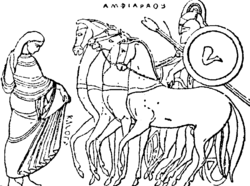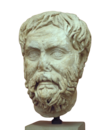Amphiaraus

In Greek mythology, Amphiaraus or Amphiaraos (/ˌæmfiəˈreɪəs/; Ancient Greek: Ἀμφιάραος, Ἀμφιάρεως, "very sacred"[1]) was the son of Oicles, a seer, and one of the leaders of the Seven against Thebes. Amphiaraus at first refused to go with Adrastus on this expedition against Thebes as he foresaw the death of everyone who joined the expedition. His wife, Eriphyle, eventually compelled him to go.[2]
Family
Amphiaraus was the son of
Amphiaraus married
The Clytidae (alternate spelling "Klytidiai"), a clan of seers at Olympia, claimed to be the descendants of a Clytius, who they said was the son of Amphiaraus' son Alcmaeon.[13] According to Roman legends, the founder of the town of Tibur (modern Tivoli) near Rome, was a son of Amphiaraus.[14]
Mythology
Amphiaraus was a seer, and greatly honored in his time. Both Zeus and Apollo favored him, and Zeus gave him his oracular talent. In the generation before the Trojan War, Amphiaraus was one of the heroes present at the Calydonian boar hunt.[15]
The material of the tragic war of the
In the battle, Amphiaraus sought to flee from Periclymenus, the "very famous"[20] son of Poseidon, who wanted to kill him, but Zeus threw his thunderbolt, and the earth opened to swallow and conceal Amphiaraus – right on the same spot the laurel had grown from his spear[19] – and his chariot, before Periclymenus could stab him in the back and thereby disgrace his honor.[21] Thus becoming a chthonic hero, Amphiaraus was later propitiated and consulted at his sanctuary.
Legacy

Alcmaeon killed his mother when Amphiaraus died. He was pursued by the
In a sanctuary at the
Amphiaraia (ἀμφιαράϊα), were games celebrated in honour of Amphiaraus in Oropus.[23]
Philosophy
| Part of a series on |
| Pyrrhonism |
|---|
 |
|
|
In the Python, the first book to describe Pyrrhonist philosophy, the book's author, Timon of Phlius first meets Pyrrho on the grounds of the temple of Amphiaraus. The symbolism of this may be due to Pyrrho being a member of the Clytidae, a clan of seers in Elis who interpreted the oracles of the Temple of Zeus at Olympia. The founder of the clan was claimed to be Clytius, the grandson of Amphiaraus.[24]
Popular culture
- In March 1815 Franz Schubert set "Amphiaraos," a poem by Theodor Körner, as a lied for voice and piano, D 166.[25] It was first published in the Franz Schubert's Works edition in 1894.[26] The New Schubert Edition included the song in Series IV, Volume 8.[27]
- In Dante Alighieri's Inferno, King Amphiaraus was seen in the Sorcerers' section of Hell's Circle of Fraud where his action of foreseeing his death is mentioned.
Notes
- ^ Oxford Classical Dictionary s.v. Amphiaraus.
- ^ Oxford Classical Dictionary s.v. Amphiaraus; Parada, s.v. Amphiaraus.
- Fabulae 70, 73. Amphiaraus as the son of Oicles is attested as early as Homer, Odyssey, 15.243, see also Bacchylides, 9.10–24; Pindar, Pindar, Nemean, 9.13–17, 10.7–9, Olympian 6.13–17, Pythian 8.39–55; Apollodorus, 3.6.3. For genealogical tables showing Amphiaraus and other of the descendants of Melampus, see Hard, p. 706, Table 13, and Grimal, p. 525, Table I.
- Polyidus; for a discussion see Hard, pp. 429–430.
- ^ For a discussion of the dynastic history of the Argolid, see Hard, pp. 332–335.
- Fabulae70.
- ^ For Hypermnestra, see Hard, p. 413.
- Fabulae 70. As H. J. Rose, Oxford Classical Dictionary s.v. Amphiaraus, points out, a seer being said to have been the son of Apollo was not uncommon, see e.g. Aristaeus, Iamus, and Idmon.
- ^ Apollodorus, 1.9.13, 3.6.2 (Eriphyle as wife), 3.7.2 (father of Alcmaeon and Amphilochus). Eriphyle as Amphiaraus' wife is alluded to by Homer, Odyssey 11.326–327 ("hateful Eriphyle, who took precious gold as the price of the life of her own lord"), 15.246–247 ("Amphiaraus" [who died at Thebes] "because of a woman's gifts"). For Eriphyle as wife, see also Pindar, Nemean 9.16–17; Diodorus Siculus, 4.65.6. For Alcmaeon as son see also Pausanias 6.17.6.
- ^ Gantz, p. 508; Frazer, pp. 608–610; Pausanias, 5.17.7.
- ^ Pausanias, 5.17.8 [= Asius fr. 4 West.
- ^ Plutarch, Quaestiones Graecae 23.
- ^ Hard, p. 430; Pausanias, 6.17.6.
- Natural History, 16.87. Solinus, reports that, according to Cato, "Catillus the Arcadian", an officer of Evander, was the founder of Tibur, and Solinus goes on to say that this Catillus was the son of Amphiaraus, and that, on his grandfather Oicles' orders, he migrated to Italy, had three sons Tibertus, Coras and Catillus, expelled the Sicilia from the town of Sicani, and renamed the town Tibur after his eldest son Tibertus. Pliny the Elder, says that the founder of Tivoli was Amphiaraus' son Tiburnus. See also Virgil, Aeneid 7.670–672, Horace, Odes 1.18.2, 2.6.5.
- ^ Pseudo-Apollodorus, Bibliotheca 1.8.2: "Atalanta was the first to shoot the boar in the back with an arrow, and Amphiaraus was the next to shoot it in the eye; but Meleager killed it by a stab in the flank...".
- ^ Pseudo-Apollodorus, Bibliotheca 3.8.2
- ^ Roman, L., & Roman, M. (2010). Encyclopedia of Greek and Roman mythology., p. 57, at Google Books
- ^ Pseudo-Apollodorus, Bibliotheca 3.6.2
- ^ a b Plutarch, Parallel Lives 6
- ^ Karl Kerenyi (The Heroes of the Greeks, 1959, p. 300) noted that the name would also be a suitable epithet for Hades.
- ^ Pindar, Nemean Odes 9
- ^ See Incubation (ritual).
- ^ A Dictionary of Greek and Roman Antiquities (1890), Amphiaraia
- ISBN 31102208062009 p51
- ^ Amphiaraos at The LiederNet Archive
- ^ Otto Erich Deutsch. Schubert Thematic Catalogue. 1978. p. 118
- ^ Lieder, Band 8 at www
.baerenreiter .com
References
- Apollodorus, The Library with an English Translation by Sir James George Frazer, F.B.A., F.R.S. in 2 Volumes, Cambridge, MA, Harvard University Press; London, William Heinemann Ltd. 1921. ISBN 0-674-99135-4. Online version at the Perseus Digital Library. Greek text available from the same website.
- Apps, Arwen Elizabeth, Gaius Iulius Solinus and His Polyhistor, Macquarie University (PhD dissertation), 2011.
- Bacchylides, Odes, translated by Diane Arnson Svarlien. 1991. Online version at the Perseus Digital Library.
- Diodorus Siculus, Diodorus Siculus: The Library of History. Translated by C. H. Oldfather. Twelve volumes. Loeb Classical Library. Cambridge, Massachusetts: Harvard University Press; London: William Heinemann, Ltd. 1989. Online version by Bill Thayer.
- Frazer, J. G., Pausanias's Description of Greece. Translated with a Commentary by J. G. Frazer. Vol III. Commentary on Books II-V, Macmillan, 1898. Internet Archive.
- ISBN 978-0-8018-5362-3(Vol. 2).
- Grimal, Pierre, The Dictionary of Classical Mythology, Wiley-Blackwell, 1996. ISBN 978-0-631-20102-1.
- Hard, Robin, The Routledge Handbook of Greek Mythology: Based on H.J. Rose's "Handbook of Greek Mythology", Psychology Press, 2004, ISBN 9780415186360. Google Books.
- Homer, The Iliad with an English Translation by A.T. Murray, Ph.D. in two volumes. Cambridge, Massachusetts, Harvard University Press; London, William Heinemann, Ltd. 1924. Online version at the Perseus Digital Library.
- Homer, The Odyssey with an English Translation by A.T. Murray, PH.D. in two volumes. Cambridge, Massachusetts, Harvard University Press; London, William Heinemann, Ltd. 1919. Online version at the Perseus Digital Library.
- Horace. Odes and Epodes. Edited and translated by Niall Rudd. Loeb Classical Library No. 33. Cambridge, Massachusetts: Harvard University Press, 2004. Online version at Harvard University Press.
- ISBN 978-0-87220-821-6.
- ISBN 0-19-869117-3.
- Parada, Carlos, Genealogical Guide to Greek Mythology, Jonsered, Paul Åströms Förlag, 1993. ISBN 978-91-7081-062-6.
- Pausanias, Graeciae Descriptio. 3 vols. Leipzig, Teubner. 1903. Greek text available at the Perseus Digital Library.
- Plutarch, Moralia, Volume IV: Roman Questions. Greek Questions. Greek and Roman Parallel Stories. On the Fortune of the Romans. On the Fortune or the Virtue of Alexander. Were the Athenians More Famous in War or in Wisdom?. Translated by Frank Cole Babbitt. Loeb Classical Library 305. Cambridge, MA: Harvard University Press, 1936.
- .
- Race, William H. (1997a), Pindar: Nemean Odes. Isthmian Odes. Fragments, Edited and translated by William H. Race. .
- Race, William H. (1997b), Pindar: Olympian Odes. Pythian Odes. Edited and translated by William H. Race. .
- Smith, William (1854), Dictionary of Greek and Roman Geography, London (1854). Online version at the Perseus Digital Library.
- Smith, William (1873), Dictionary of Greek and Roman Biography and Mythology, London (1873). Online version at the Perseus Digital Library.
- .
- .



